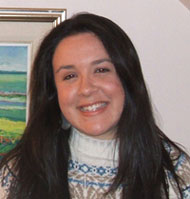June Callwood Fellowship in Aboriginal Law
Ontario Federation of Indian Friendship Centres (OFIFC)
 Emma's main goal for the summer was to strengthen the Ontario Aboriginal Courtwork programs in order to better serve OFIFC's constituents by increasing information and improving communication about the programs' content, context and clientele. In order to achieve this, Emma produced a statistical analysis of the Ontario Aboriginal Criminal and Family Courtwork programs. From this analysis, she identified trends in the programs and determined existing strengths and weaknesses. In addition, Emma developed and amended existing Public Legal Education materials to better reflect the clientele base and changing legislation. These materials included a pamphlet for self-represented parties in court and a family law manual for courtworkers. OFIFC also provided Emma with a number of unique experiences throughout the summer, including the chance to attend a sweetgrass picking at Wasauksing First Nation and the opportunity to attend the provincial justice training session for courtworkers in London, Ontario.
Emma's main goal for the summer was to strengthen the Ontario Aboriginal Courtwork programs in order to better serve OFIFC's constituents by increasing information and improving communication about the programs' content, context and clientele. In order to achieve this, Emma produced a statistical analysis of the Ontario Aboriginal Criminal and Family Courtwork programs. From this analysis, she identified trends in the programs and determined existing strengths and weaknesses. In addition, Emma developed and amended existing Public Legal Education materials to better reflect the clientele base and changing legislation. These materials included a pamphlet for self-represented parties in court and a family law manual for courtworkers. OFIFC also provided Emma with a number of unique experiences throughout the summer, including the chance to attend a sweetgrass picking at Wasauksing First Nation and the opportunity to attend the provincial justice training session for courtworkers in London, Ontario.
Emma writes: "I came to law school with fairly specialized experience and a specific purpose. A member of Curve Lake First Nation, my decision to become a lawyer is very much coloured by my heritage as an Anishinaabe woman, and fuelled by a desire to contribute to the advancement of Aboriginal Peoples. However, I found that during my first year of law school, it was easy to lose sight of this purpose. With classes, readings, exams and essays, the law became a purely academic pursuit, far removed from my reality.
Working with the Ontario Federation of Indian Friendship Centres (OFIFC) this summer reminded me of the real and tangible effects of Canadian law on Aboriginal peoples. Over the course of my fellowship I had the opportunity to analyze the Ontario Aboriginal Courtwork Program and create legal education materials for First Nation, Inuit and Métis peoples in conflict with the law. My work was meaningful and beneficial to the organization, and I could once again see the practical application and value of a legal education to Aboriginal peoples.
More than this though, I learned that in order to become effective as an Aboriginal lawyer, it will be necessary not only to study Canadian law as it applies to Aboriginal peoples, but also to understand Indigenous laws, cultures and history. Staff members at OFIFC helped me to realize the importance of this aspect of my education by including me in the daily smudge of the office, inviting me to pick sweetgrass at Wasauksing First Nation and sharing with me songs, prayers and traditional teachings during meetings and training sessions.
My experience with the June Callwood Fellowship was rewarding because it reminded me of my purpose in law school and inspired me to continue building my legal skills and cultural knowledge so that I can better serve my people, my community and Aboriginal nations in general."

 Emma's main goal for the summer was to strengthen the Ontario Aboriginal Courtwork programs in order to better serve OFIFC's constituents by increasing information and improving communication about the programs' content, context and clientele. In order to achieve this, Emma produced a statistical analysis of the Ontario Aboriginal Criminal and Family Courtwork programs. From this analysis, she identified trends in the programs and determined existing strengths and weaknesses. In addition, Emma developed and amended existing Public Legal Education materials to better reflect the clientele base and changing legislation. These materials included a pamphlet for self-represented parties in court and a family law manual for courtworkers. OFIFC also provided Emma with a number of unique experiences throughout the summer, including the chance to attend a sweetgrass picking at Wasauksing First Nation and the opportunity to attend the provincial justice training session for courtworkers in London, Ontario.
Emma's main goal for the summer was to strengthen the Ontario Aboriginal Courtwork programs in order to better serve OFIFC's constituents by increasing information and improving communication about the programs' content, context and clientele. In order to achieve this, Emma produced a statistical analysis of the Ontario Aboriginal Criminal and Family Courtwork programs. From this analysis, she identified trends in the programs and determined existing strengths and weaknesses. In addition, Emma developed and amended existing Public Legal Education materials to better reflect the clientele base and changing legislation. These materials included a pamphlet for self-represented parties in court and a family law manual for courtworkers. OFIFC also provided Emma with a number of unique experiences throughout the summer, including the chance to attend a sweetgrass picking at Wasauksing First Nation and the opportunity to attend the provincial justice training session for courtworkers in London, Ontario.